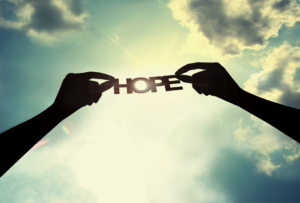
Dr. Kathleen Mojas
For many people, 2016 was filled with struggles and challenges. If you are one of those who had a tough ride last year, then maybe you’re already wondering how you can overcome the effect of 2016. One surprising answer is by cultivating hope and optimism.
Hope is thinking that somehow things are going to get better. It is less an emotion and more a state of mind that can overcome feelings of despair. Hope can provide you with light in times of darkness. Expecting that things will get better is not only healing, it’s contagious. If you have hope, then you can also infect the same level of hope in others.
2017 has just started, and the best resolution you could promise yourself would be a change in perspective that could help you cultivate an optimistic and hopeful attitude, that if perpetuated, could last throughout the year and the years to come.
So here are some of the reasons why hope is extremely important for you, at the beginning of the year 2017:
Hope Has Positive Effect on Health
Hope and optimism have been studied by examining the way people make sense of their problems. People who explain negative events as being specific to that one situation, temporary versus permanent and not personal to themselves, tend to be not only more optimistic but more resilient, less stressed and healthier. Studies have verified that having a positive state of mind positively affect your health, boosts your immune functioning and even helps those with cancer and heart disease have higher rates of survivial. If you train your mind to be hopeful and optimistic then it actually has a positive impact on your overall health and healing abilities.
New studies also suggest that hope is capable of helping to reduce pain because it signals the release of endorphins produced by the pituitary gland then sends these to the nervous system, thereby blocking pain messages.
Hope Relieves stress
Having hope can help reduce your stress. If you’re hopeful, then you’ll most likely handle disappointments and failures through a more positive lens, looking on the bright side for lessons learned or unexpected blessings in the midst of misfortunes. Even if you have an unpleasant present, your hopeful attitude will help you envision a more positive future, allowing you to buffer stress and reduce the negative impact of disappointments and other negative events.
Having a hopeful and positive explanatory style lets you develop an optimistic attitude, making it possible for you to recognize that you’re capable and adaptable. You are more likely to feel reassured that you can handle even the toughest of life’s challenges.
Hope in 2017
The bottom line is whether you are upset about the current political climate, have lost your job, had a bad break up or have been diagnosed with an illness, if you explain your troubles in the following three ways you will be more likely to prevail. 1) Your pain or loss is only temporary, things will get better. Good things often come out of bad situations. 2) This situation is specific to this problem, instead of a global pattern of doom, it’s just a situational setback. 3) It’s not personal. Bad things happen to good people all the time. If you habitually view your troubles with this kind of explanatory style you will boost your resilience, your immune system and your quality of life. Being hopeful is the key towards a happier and more productive 2017.
We cannot change our past but we can make a choice every day regarding the way we view the past and the attitude we will embrace going forward into the future.
References:
http://serendip.brynmawr.edu/bb/neuro/neuro04/web1/mbond.html
https://www.psychologytoday.com/blog/pressure-proof/201303/5-ways-hope-impacts-health-happiness
http://edition.cnn.com/2013/04/11/health/hope-healing-enayati/
Abrahamson, L.; Y. Seligman; M. Teasdale (1978). “Learned Helplessness in Humans: Critique and Reformulation”. Abnormal Psychology. 87 (1): 49–74. doi:10.1037/0021-843X.87.1.49. PMID649856.

